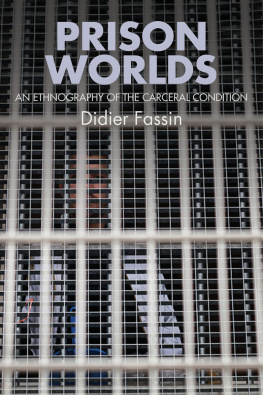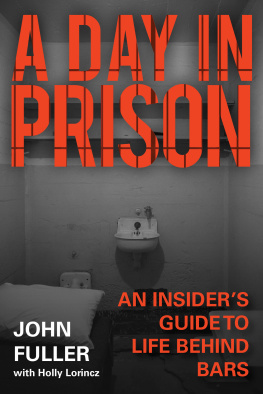Contents
Guide
Pages

Prison Worlds
An Ethnography of the Carceral Condition
Didier Fassin
Translated by Rachel Gomme
polity
Copyright Didier Fassin 2017
The right of Didier Fassin to be identified as Author of this Work has been asserted in accordance with the UK Copyright, Designs and Patents Act 1988.
First published in French as LOmbre du monde. Une anthropologie de la condition carcrale ditions du Seuil, 2015
This English edition published in 2017 by Polity Press
Polity Press
65 Bridge Street
Cambridge CB2 1UR, UK
Polity Press
350 Main Street
Malden, MA 02148, USA
All rights reserved. Except for the quotation of short passages for the purpose of criticism and review, no part of this publication may be reproduced, stored in a retrieval system, or transmitted, in any form or by any means, electronic, mechanical, photocopying, recording or otherwise, without the prior permission of the publisher.
ISBN-13: 978-1-5095-0758-0
A catalogue record for this book is available from the British Library.
Library of Congress Cataloging in Publication Control Number: 2016031519
The publisher has used its best endeavors to ensure that the URLs for external websites referred to in this book are correct and active at the time of going to press. However, the publisher has no responsibility for the websites and can make no guarantee that a site will remain live or that the content is or will remain appropriate.
Every effort has been made to trace all copyright holders, but if any have been inadvertently overlooked the publisher will be pleased to include any necessary credits in any subsequent reprint or edition.
For further information on Polity, visit our website: politybooks.com
To L. H. and all those for whom prison makes this life, which they are in the process of pointlessly losing, so insistently precious
To F. F. and all those working in prisons who strive to make incarceration more dignified, or simply more livable
For A.C. D. and all those who work to defend the rights of prisoners and to improve prison conditions
And by justice I mean nothing other than the restraint necessary to hold particular interests together, without which men would collapse into the old state of unsociability. Any punishment that goes beyond the need to preserve this bond is unjust by its very nature.
Cesare Beccaria, On Crimes and Punishments, 1764
But the prison memoirs Scenes from the House of the Dead, as he himself called them somewhere in the manuscript appeared to me to be not without interest. The completely strange world, unknown until that time, the strangeness of some of the facts, some particular notes on those lost souls, attracted me, and I read with curiosity.
Fyodor Dostoevsky, Memoirs from the House of the Dead, 1862
There people live their hard and heavy lot cooped in deep rooms, their gestures show theyre scared, more terrified than any yearling herd; and outside wakes your earth, its breath is stirred, but these, though living still, now know it not.
Rainer Maria Rilke, The Book of Poverty and Loss, 1903
Preface to the English Edition
A World of Prisons
Presented by its promoters two and a half centuries ago as moral progress in the administration of punishment, prison has become over the past decades one of the most vexing and unsettling issues in Western societies for both the spectacular increase of its population and the grim reality of its facilities. But while imprisonment is today in most countries the ineluctable reference and the ultimate horizon of the penal system, until recently neither its efficacy in reducing crime nor its respect for democratic principles has been seriously discussed outside a few academic circles. The correctional institution has been taken for granted and is barely visible. An elephant in the room, it has largely been ignored by the public. To take the most extreme example, in the United States, the number of people incarcerated increased more than sevenfold over four decades, reaching the impressive figure of 2.3 million inmates in the early 2010s, which made the countrys incarceration rate the highest in the world, yet without provoking a major debate. New laws were constantly being passed, imposing new mandatory minimum sentencing and criminalizing new offenses. New facilities were regularly being built, involving new private actors and new security measures. An ever tougher legislation and an expanding correctional system were business as usual in government, and these widely popular policies were little questioned. Only in recent years has the problem begun to be addressed, in large part because of the colossal share it represents in the states budgets. The political, moral, and social implications of mass incarceration have remained for the most part in the background.
In fact, what prisons entail involves two distinct, albeit related, aspects: penal and correctional how offenders are punished and how incarceration is conducted. Studying the penal system involves analyzing how problems are socially constructed, how the public emotionally reacts to particular events, how some crimes are deemed serious and others are not, how the executive and the legislator produce norms and laws, how the police use their discretionary power to focus on specific offenses or offenders, how prosecutors and judges decide to indict and sentence certain acts while ignoring others. In the end, it is this entire complex process that leads to the filling or emptying of prisons and determines the composition of their population. Studying the correctional system implies examining the infrastructure and functioning of its facilities, the recruitment, training, activity, and supervision of its personnel, the rights and obligations that inmates are supposed to have, the daily interactions among those who are confined and with those who guard them, the formal and informal modes of regulating, settling, and sanctioning the various issues that may arise. Indeed, it is this dense network of material and immaterial elements that defines what life in prison looks like for those who serve a sentence as well as for those who work there.
Both the investigation of the penal chain and the inquiry into the correctional apparatus are indispensable to a full understanding of the prison system. However, they represent distinct challenges for social scientists, since the former, being open, is much more accessible to direct observation and other scientific approaches than the latter, which is, by definition, closed. This explains why most research is carried out on the penal chain, while little knowledge is available about the correctional apparatus. This is particularly true in the United States, where an impressive sum of sociological, historical, and legal studies exists on the logics and mechanisms that have led to the phenomenon known as mass incarceration, but where what it means to be incarcerated for the millions of individuals who enter prisons and jails each year is hardly studied. Indeed, the Federal Bureau of Prisons, most of the 50 State Departments of Corrections, and the 3,000 local jails have maintained a high degree of opacity regarding what goes on in their facilities, restricting both scientific activities and external assessment, and therefore avoiding public or legal accountability about how prisoners are treated. It is much less the case, however, in other countries, such as Britain, where observational methods and interview techniques have recently resulted in substantial works on prison.







